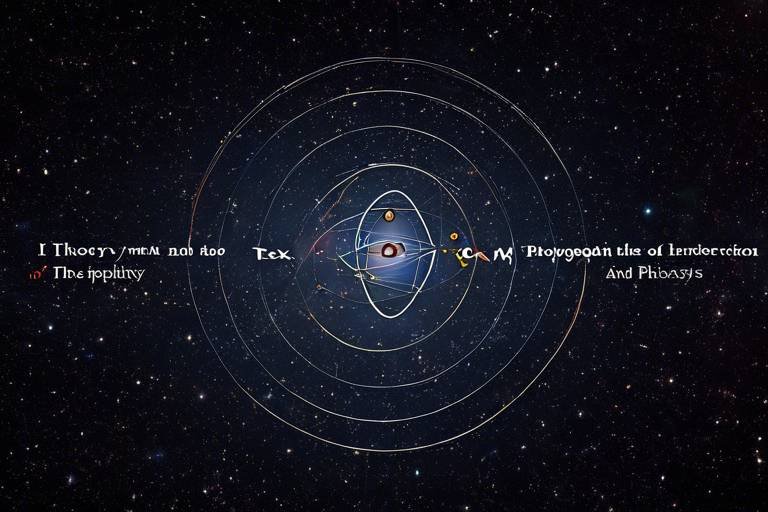The Helix - Philosophy and Natural Sciences Interactions
In a world where the boundaries between disciplines are constantly blurring, the interaction between philosophy and natural sciences stands out as a fascinating and complex relationship. Imagine two dancers on a stage, each bringing their own rhythm and style, yet creating a beautiful harmony together. This is precisely how philosophy and science interact; they influence and shape each other in profound ways, ultimately enhancing our understanding of the universe and our existence within it.
Philosophy serves as the bedrock upon which the edifice of scientific inquiry is built. It offers the foundational principles that guide scientists in their quest for knowledge. Without the philosophical underpinnings, scientific methodologies would lack direction, much like a ship without a compass. For instance, concepts such as causality, existence, and truth are not merely abstract ideas; they are essential for formulating hypotheses and conducting experiments. The philosophical inquiry into what it means to know something or to understand reality plays a crucial role in shaping scientific practices.
On the flip side, scientific inquiry continually challenges and refines philosophical ideas. Think of it as a constant dialogue where each side influences the other. Empirical evidence—data gathered through observation and experimentation—serves as a reality check for philosophical theories. When philosophers make grand claims about the nature of reality, scientists are there to test these claims against the fabric of observable phenomena. This dynamic interplay not only propels scientific advancement but also leads to the evolution of philosophical thought, making it more robust and applicable to real-world scenarios.
As we delve deeper into this intricate relationship, we uncover layers of complexity, such as the intersection of epistemology and the scientific method. Epistemology, the study of knowledge itself, raises essential questions: What does it mean to know? How do we acquire knowledge? These questions are not just academic; they have real implications for how scientists approach their work. For example, the reliability of scientific conclusions often hinges on philosophical discussions surrounding the nature and limits of human understanding.
In this context, the debate between rationalism and empiricism becomes particularly significant. Rationalists argue that knowledge can be gained through reason and logical deduction, while empiricists contend that knowledge arises from sensory experience. This philosophical dichotomy influences scientific methodologies profoundly. Scientists must navigate these waters, often integrating both perspectives to formulate a comprehensive understanding of the phenomena they study.
Another philosophical conundrum that looms large in the realm of science is the problem of induction. This dilemma questions the reliability of drawing general conclusions from specific observations. For instance, just because the sun has risen in the east every day of our lives does not guarantee it will do so tomorrow. This uncertainty challenges the very fabric of scientific knowledge, prompting scientists and philosophers alike to reconsider the foundations of their conclusions.
Moreover, ethical considerations cannot be overlooked in this interplay. The realm of ethics in scientific research is deeply rooted in philosophical thought. Questions about what is right or wrong, just or unjust, are not merely academic exercises; they have tangible impacts on how scientific research is conducted. Ethical frameworks guide scientists in making responsible decisions, ensuring that their work contributes positively to society while minimizing harm.
As we explore the rich tapestry of interactions between philosophy and natural sciences, it becomes evident that these fields are not isolated silos but rather interconnected domains that enhance our understanding of complex issues. The interdisciplinary approaches that arise from this collaboration offer innovative perspectives, pushing the boundaries of human knowledge and inquiry.
In summary, the intricate relationship between philosophy and natural sciences is akin to a helix, where each strand supports and enriches the other, creating a robust structure of understanding. As we continue to navigate the challenges of existence and the universe, this dynamic interplay will remain crucial in our quest for knowledge and truth.
- How do philosophy and science influence each other? Philosophy provides the foundational principles that guide scientific inquiry, while scientific discoveries challenge and refine philosophical ideas.
- What is epistemology? Epistemology is the study of knowledge, focusing on its nature, sources, and limits, and it intersects with the scientific method.
- What are the implications of the problem of induction? The problem of induction raises questions about the reliability of scientific conclusions drawn from specific observations.
- Why is ethics important in scientific research? Ethical considerations ensure that scientific practices are responsible and contribute positively to society.

The Foundations of Philosophy in Science
Philosophy serves as the backbone of scientific inquiry, providing the essential principles that shape our understanding of the natural world. At its core, philosophy asks the big questions—questions that probe the very nature of existence, knowledge, and reality itself. When we venture into the realm of science, we find that many of the methodologies and frameworks we rely on are deeply rooted in philosophical thought. For instance, concepts such as causality, evidence, and the nature of truth are not merely scientific concerns; they are philosophical inquiries that have been debated for centuries.
In this context, the relationship between philosophy and science is akin to a dance, where each partner influences the other's movements. Philosophy challenges scientists to think critically about the assumptions underlying their work, prompting questions like: What constitutes valid evidence? How do we differentiate between correlation and causation? Such inquiries are essential for refining scientific methods and ensuring the rigor of scientific conclusions.
Moreover, the philosophical foundations of science help delineate the boundaries of scientific inquiry. For example, the principle of falsifiability, introduced by philosopher Karl Popper, asserts that for a theory to be scientific, it must be testable and refutable. This principle has significant implications for how scientists formulate hypotheses and interpret data. Without such philosophical guidelines, the scientific process could devolve into a series of ungrounded claims lacking the necessary scrutiny.
Additionally, philosophy provides a framework for understanding the ethical implications of scientific research. As we explore the universe, we must also grapple with the moral responsibilities that come with such exploration. Questions about the ethical treatment of research subjects, the environmental impact of scientific advancements, and the societal consequences of new technologies are all steeped in philosophical discourse. Thus, philosophy not only informs scientific methodology but also enriches the dialogue surrounding the ethical dimensions of scientific practice.
In summary, the foundations of philosophy in science are indispensable. They guide the scientific method, challenge our assumptions, and ensure that our pursuit of knowledge is both rigorous and ethically sound. As we continue to explore the mysteries of the universe, we must remain aware of the philosophical underpinnings that shape our understanding of the natural world.
- What is the role of philosophy in scientific inquiry?
Philosophy provides the foundational principles that guide scientific inquiry, shaping methodologies and the pursuit of knowledge. - How does scientific inquiry influence philosophical thought?
Scientific inquiry challenges and refines philosophical ideas, leading to the evolution of philosophical theories based on empirical evidence. - What is the significance of epistemology in science?
Epistemology examines the nature of knowledge and its impact on scientific practices, influencing how scientists approach research and validate their findings. - Why are ethical considerations important in scientific research?
Ethics ensures that scientific practices are conducted responsibly, considering the implications of research on society and the environment.

The Role of Scientific Inquiry in Philosophy
Scientific inquiry plays a pivotal role in shaping philosophical thought, acting as a dynamic force that challenges, refines, and sometimes even overturns established ideas. Imagine philosophy as a vast ocean of theories and concepts, while scientific inquiry is like a powerful current that flows through it, reshaping the landscape, revealing hidden depths, and sometimes creating waves of change. This interaction is not merely a one-way street; rather, it's a vibrant dialogue where each discipline learns from the other, leading to a richer understanding of the universe and our place within it.
At the heart of this relationship lies the concept of empirical evidence. Scientific inquiry relies heavily on observation and experimentation, which serve as the bedrock for validating or refuting philosophical claims. For instance, take the age-old question of free will. Philosophers have debated whether our choices are predetermined or if we possess true agency. However, advancements in neuroscience, through scientific inquiry, have provided insights into how our brain functions during decision-making. This empirical evidence can either bolster philosophical arguments for free will or challenge them, leading to new interpretations and theories.
Moreover, the evolution of philosophical theories often hinges on the findings of scientific research. Consider the philosophical implications of quantum mechanics. This branch of physics has not only transformed our understanding of the micro-world but has also sparked philosophical debates about reality itself. Questions arise: If particles can exist in multiple states simultaneously, what does that say about our perception of reality? How does this influence our understanding of causality and determinism? These inquiries exemplify how scientific discoveries can provoke profound philosophical reflections.
Interestingly, the relationship between scientific inquiry and philosophy is also marked by a certain degree of tension. Philosophers often grapple with the limitations of scientific knowledge, questioning whether empirical methods can truly capture the complexities of human experience. For example, the field of ethics, which is deeply philosophical, often finds itself at odds with the objective nature of scientific inquiry. While science can provide data on human behavior, it struggles to address the moral implications of that behavior. This tension invites a deeper exploration of how we can integrate scientific findings with ethical considerations, creating a more holistic understanding of humanity.
In essence, the interplay between scientific inquiry and philosophy is a dance of sorts—each step taken by one influences the rhythm of the other. As scientific inquiry continues to push the boundaries of what we know, philosophy adapts, questioning assumptions and broadening the horizons of understanding. This synergy not only enriches both fields but also enhances our comprehension of complex issues that define our existence.
- How does scientific inquiry influence philosophical thought? Scientific inquiry provides empirical evidence that can challenge or support philosophical theories, leading to a deeper understanding of various concepts.
- Can philosophy exist without science? While philosophy can exist independently, scientific inquiry enriches philosophical discussions by grounding them in observable reality.
- What are some examples of philosophical questions influenced by science? Questions regarding free will, the nature of reality, and the implications of scientific findings on ethics are all influenced by scientific inquiry.
- Is there a conflict between science and philosophy? There can be tension between the two, particularly when empirical methods struggle to address complex human experiences and ethical dilemmas.

Epistemology and Scientific Method
When we dive into the realm of epistemology, we are essentially exploring the nature of knowledge itself. This philosophical discipline is all about understanding how we know what we know, and it plays a pivotal role in shaping the scientific method. The scientific method, a systematic approach to inquiry, is not just a set of procedures; it’s deeply rooted in epistemological questions that challenge us to consider the validity and reliability of our knowledge.
At its core, epistemology asks questions like: What constitutes knowledge? How do we differentiate between belief and justified true belief? These inquiries are crucial when scientists formulate hypotheses, conduct experiments, and interpret data. For instance, when a scientist claims to have discovered a new phenomenon, they must consider whether their findings are based on empirical evidence or mere speculation. This distinction is vital because it influences the credibility and acceptance of scientific claims.
Moreover, the scientific method itself can be viewed as an epistemological tool. It provides a structured process that helps scientists gather knowledge through observation, experimentation, and analysis. Here’s how the interplay between epistemology and the scientific method unfolds:
- Observation: This is the starting point of scientific inquiry, where scientists gather data from the natural world. Epistemologically, it raises questions about the reliability of sensory perception.
- Hypothesis Formation: Scientists propose explanations based on observed phenomena. This process is rooted in epistemological theories that assess the plausibility of these hypotheses.
- Experimentation: Rigorous testing of hypotheses through controlled experiments allows scientists to gather empirical evidence. Here, epistemology challenges the assumptions underlying these experiments.
- Analysis and Conclusion: After data collection, scientists analyze their findings to draw conclusions. Epistemological frameworks guide the interpretation of these results, determining whether they can be deemed knowledge.
One significant aspect of this relationship is the problem of induction. This philosophical dilemma questions whether we can truly justify our conclusions based on repeated observations. For example, just because the sun has risen every day of our lives, can we confidently say it will rise tomorrow? This uncertainty poses challenges for scientists who rely on patterns and predictions derived from empirical data. It forces them to confront the limitations of their conclusions and consider alternative explanations.
Furthermore, the scientific method is not static; it evolves as our understanding of knowledge deepens. As new philosophical insights emerge, they can lead to modifications in how scientists approach their research. This dynamic interaction between epistemology and the scientific method not only enriches our understanding of the universe but also encourages a more critical examination of the scientific enterprise itself.
In summary, the relationship between epistemology and the scientific method is intricate and multifaceted. By interrogating the foundations of knowledge, we can enhance the rigor of scientific inquiry and push the boundaries of what we understand about reality. It’s a continuous cycle of questioning, testing, and refining our beliefs, ensuring that our pursuit of knowledge remains as robust as possible.
- What is epistemology? Epistemology is the study of knowledge, its nature, and how we acquire it.
- How does epistemology influence scientific research? It shapes the methods and frameworks scientists use to validate their findings.
- What is the problem of induction? It questions the justification of generalizing conclusions based on past observations.
- Why is the scientific method important? It provides a systematic approach to inquiry that helps ensure the reliability of scientific knowledge.

Rationalism vs. Empiricism
The debate between rationalism and empiricism is a cornerstone of philosophical inquiry, significantly affecting how we approach scientific methodology. At its core, rationalism posits that reason and innate ideas are the primary sources of knowledge. Think of it like building a house; rationalists believe the blueprints (logical reasoning) are more important than the bricks (experiences). They argue that certain truths exist independently of sensory experience, such as mathematical and ethical principles. For instance, a rationalist might assert that the statement "2 + 2 4" holds true regardless of whether anyone has ever counted physical objects to verify it.
On the flip side, empiricism champions the idea that knowledge comes primarily from sensory experience. Empiricists argue that our understanding of the world is rooted in what we can observe, measure, and test. Imagine a scientist in a lab, meticulously recording data and drawing conclusions based on experiments—this is the empirical approach in action. Empiricists would contend that without observation, knowledge is speculative at best. They often cite how scientific advancements stem from experimentation and observation, emphasizing that theories must be grounded in real-world data.
This philosophical tug-of-war raises critical questions about the nature of scientific inquiry. For example, how do we validate a theory? Is it through logical reasoning or through empirical evidence? The tension between these two perspectives can lead to fascinating discussions. Some philosophers argue that a balanced approach, incorporating both rationalist and empiricist elements, is essential for a robust scientific methodology. This perspective suggests that while we can develop hypotheses through rational thought, we must also rigorously test these ideas through empirical observation.
To illustrate the differences and interplay between these two philosophies, consider the following table:
| Aspect | Rationalism | Empiricism |
|---|---|---|
| Source of Knowledge | Reason and innate ideas | Sensory experience |
| Methodology | Logical deduction | Observation and experimentation |
| Examples | Mathematics, ethics | Natural sciences, psychology |
Ultimately, the rationalism vs. empiricism debate is not just academic; it has real-world implications in how we conduct scientific research and interpret findings. Are we merely collecting data, or are we also seeking to understand the underlying principles that govern that data? This question is at the heart of many scientific endeavors, influencing everything from theoretical physics to social science research. As we navigate through this complex landscape, it becomes clear that both rationalist and empiricist approaches offer valuable insights, and perhaps the most fruitful path lies in their integration.
- What is rationalism? Rationalism is the philosophical view that reason and intellectual deduction are the primary sources of knowledge, independent of sensory experience.
- What is empiricism? Empiricism is the belief that knowledge comes primarily from sensory experience and that all concepts must be grounded in observable phenomena.
- How do rationalism and empiricism influence scientific research? Rationalism influences the formulation of hypotheses and theories, while empiricism emphasizes the importance of testing and observation in validating those theories.
- Can rationalism and empiricism coexist? Yes, many philosophers argue that a combination of both approaches leads to a more comprehensive understanding of scientific inquiry.

The Problem of Induction
The problem of induction is a philosophical conundrum that has puzzled thinkers for centuries. At its core, it questions the very foundation of how we derive general principles from specific observations. Imagine you're at a picnic, and every time you eat a sandwich, you notice that it tastes delicious. You might conclude that all sandwiches are delicious based on your experience. However, what if you encounter a sandwich that is far from tasty? This scenario illustrates the essence of the problem of induction: just because something has happened repeatedly in the past does not guarantee it will happen in the future.
Philosopher David Hume famously articulated this issue, arguing that our reliance on past experiences to predict future events lacks rational justification. He posited that while we may observe a pattern, such as the sun rising every day, there is no logical necessity that it must continue to do so. This uncertainty leads to a significant philosophical dilemma: how can we trust our scientific conclusions if they are based on inductive reasoning?
To further illustrate this point, consider the following table that outlines the key aspects of the problem of induction:
| Aspect | Description |
|---|---|
| Inductive Reasoning | The process of drawing general conclusions from specific instances. |
| Example | Every swan observed has been white; therefore, all swans are white. |
| Hume's Argument | Past occurrences do not guarantee future outcomes, challenging the validity of inductive reasoning. |
| Implications for Science | Scientific theories based on induction may lack certainty and be subject to revision. |
This dilemma has profound implications for the scientific community. If we cannot be certain that our inductive reasoning will hold true, how can we confidently assert scientific theories? This uncertainty does not render scientific inquiry useless; rather, it highlights the importance of remaining open to new evidence and revising our theories as necessary. Scientists must navigate this philosophical terrain, recognizing that while inductive reasoning is a powerful tool, it is not infallible.
In essence, the problem of induction serves as a reminder of the limits of human knowledge. It challenges us to embrace uncertainty and encourages a more nuanced understanding of how we acquire knowledge. Just as a seasoned traveler learns to adapt to unexpected detours, scientists must remain flexible in their thinking and ready to adjust their theories in light of new evidence. This philosophical challenge ultimately enriches the dialogue between philosophy and natural sciences, urging us to explore the depths of our understanding and the nature of reality itself.
- What is the problem of induction? The problem of induction questions the validity of drawing general conclusions from specific instances, highlighting the uncertainty in predicting future events based on past experiences.
- Who is a key philosopher associated with the problem of induction? David Hume is a prominent philosopher known for articulating the problem of induction and its implications for knowledge and scientific inquiry.
- How does the problem of induction affect scientific theories? It challenges the certainty of scientific conclusions derived from inductive reasoning, emphasizing the need for adaptability and openness to new evidence.

Ethics in Scientific Research
When we delve into the realm of scientific research, we encounter a landscape that is not just paved with data and experiments but is also intricately woven with the threads of ethics. The ethical considerations in science are paramount because they dictate how researchers conduct their studies, treat their subjects, and ultimately, how they contribute to the greater body of knowledge. Imagine embarking on a thrilling adventure, where every twist and turn in the path can either lead to groundbreaking discoveries or ethical dilemmas that could tarnish the integrity of the research itself. This is the duality that scientists face.
Ethics in scientific research can be broadly categorized into several key principles that guide researchers in their quest for knowledge. These principles include:
- Respect for Persons: This principle emphasizes the importance of treating individuals with dignity and acknowledging their autonomy. In practice, this means obtaining informed consent from participants, ensuring they understand the nature of the research, and allowing them the freedom to withdraw at any time.
- Beneficence: Researchers are obligated to maximize benefits and minimize harm. This principle encourages scientists to consider the potential positive outcomes of their work while being vigilant about the risks involved.
- Justice: Fairness in the selection of research subjects is crucial. This principle calls for equitable distribution of the benefits and burdens of research, ensuring that no group is unduly burdened while others reap the rewards.
These principles serve as a compass, guiding researchers through the murky waters of ethical decision-making. However, the challenge lies in the fact that ethical dilemmas are often not black and white. For instance, consider a clinical trial that promises to advance medical science but poses significant risks to participants. How do researchers balance the potential benefits to society against the risks to individuals? This is where philosophical inquiry becomes essential, as it helps to frame these questions and push us to consider the broader implications of our scientific pursuits.
Moreover, the ethical landscape of scientific research is constantly evolving, influenced by societal values, technological advancements, and historical contexts. Take, for example, the use of genetic editing technologies like CRISPR. While these technologies hold immense promise for treating genetic disorders, they also raise profound ethical questions about the extent to which we should alter human DNA. Should we play God? What are the long-term consequences of such interventions? These questions are not merely academic; they have real-world implications that require careful consideration.
In addition to these overarching principles, ethical review boards play a crucial role in maintaining the integrity of scientific research. These boards consist of diverse members who assess research proposals to ensure they adhere to ethical standards. They act as gatekeepers, scrutinizing research designs and methodologies to protect the rights and welfare of participants. This system of checks and balances is vital in fostering public trust in scientific endeavors.
Ultimately, the intersection of ethics and scientific research is a dynamic and complex relationship that requires ongoing dialogue and reflection. As we continue to push the boundaries of what is possible, we must also remain steadfast in our commitment to ethical practices. The future of science depends not only on our ability to innovate but also on our dedication to conducting research responsibly and ethically.
- What are the main ethical principles in scientific research? The main principles include respect for persons, beneficence, and justice.
- Why is ethics important in scientific research? Ethics ensures the integrity of research, protects participants, and fosters public trust.
- How do ethical review boards function? They assess research proposals to ensure compliance with ethical standards and protect participant welfare.
- What are some contemporary ethical issues in research? Issues like genetic editing, data privacy, and the use of artificial intelligence are currently at the forefront of ethical discussions.

Interdisciplinary Approaches
When we think about the intricate tapestry of knowledge that humanity has woven over the centuries, it's hard to ignore the vibrant threads of philosophy and natural sciences intertwining with one another. This intersection creates a rich landscape where ideas flourish and innovative perspectives emerge. By combining these two fields, we can tackle complex issues that neither can fully address alone, leading to a more profound understanding of our world and existence.
Consider the way a painter uses different colors to create a masterpiece. Just like that, interdisciplinary approaches allow us to blend the theoretical foundations of philosophy with the empirical rigor of the natural sciences. For instance, the philosophical inquiry into the nature of consciousness can provide valuable insights into cognitive science, while empirical findings in neuroscience can challenge and refine our philosophical perspectives on the mind. This reciprocal relationship not only enhances our knowledge but also fosters a culture of collaboration and innovation.
One significant area where this interdisciplinary synergy shines is in the field of environmental ethics. As we face pressing challenges like climate change and biodiversity loss, philosophical frameworks help us navigate the ethical implications of our scientific discoveries and technological advancements. Questions such as, "What responsibilities do we have towards future generations?" or "How should we balance economic growth with ecological sustainability?" require both philosophical reflection and scientific understanding to formulate comprehensive solutions.
Moreover, the philosophy of science plays a crucial role in shaping scientific inquiry itself. It encourages scientists to reflect critically on the assumptions and limitations of their methodologies. For example, the scientific method is not just a set of procedures; it is also a philosophical stance about how we come to know what we know. Philosophical discussions about the nature of scientific theories—like the distinction between observable and unobservable phenomena—challenge scientists to think deeply about the implications of their work.
In the realm of scientific realism versus anti-realism, we find another fertile ground for interdisciplinary dialogue. Scientific realism posits that the world described by science is real, regardless of our perceptions. In contrast, anti-realism questions the existence of unobservable entities, suggesting that scientific theories are merely useful instruments for predicting phenomena. This debate is not just academic; it influences how scientists approach their research and how philosophers interpret scientific results. Understanding these perspectives can lead to a more nuanced appreciation of scientific practice and its philosophical implications.
To illustrate the dynamic interplay between philosophy and natural sciences, let’s take a look at the following table that summarizes key areas of interdisciplinary collaboration:
| Area of Collaboration | Philosophical Questions | Scientific Contributions |
|---|---|---|
| Environmental Ethics | What are our obligations to the environment? | Research on climate change impacts and sustainability practices. |
| Cognitive Science | What is the nature of consciousness? | Studies in neuroscience and psychology. |
| Philosophy of Science | What constitutes scientific knowledge? | Development of scientific methodologies and theories. |
| Scientific Realism vs. Anti-Realism | Are unobservable entities real? | Debates on the interpretation of scientific theories. |
In conclusion, the interplay between philosophy and natural sciences is not just an academic exercise; it is a necessary dialogue that enriches both fields. By embracing interdisciplinary approaches, we can tackle the profound questions that define our existence, ensuring that our pursuit of knowledge is as holistic as it is rigorous.
- How does philosophy influence scientific research?
Philosophy provides the foundational principles and ethical considerations that guide scientific inquiry, shaping methodologies and the interpretation of results. - What is the significance of interdisciplinary approaches?
Interdisciplinary approaches allow for a more comprehensive understanding of complex issues, as they integrate diverse perspectives and methodologies from both fields. - Can philosophy and science coexist?
Absolutely! They complement each other, with philosophy challenging and refining scientific ideas while science provides empirical evidence that can inform philosophical debates.

Philosophy of Science
The serves as a bridge connecting the abstract principles of philosophy with the concrete practices of scientific inquiry. At its core, it examines the foundations, methods, and implications of science, asking profound questions about what science is and what it aims to accomplish. This field of study doesn't just sit back and observe; it actively engages with the scientific community, challenging assumptions and illuminating the complexities behind scientific theories. For instance, one might wonder: what does it mean to say that something is scientifically proven? Is it merely a matter of accumulating evidence, or is there a deeper philosophical underpinning that informs our understanding of proof itself?
In exploring the philosophy of science, we delve into several key areas, including the nature of scientific explanations, the role of scientific laws, and the distinction between science and non-science. A critical aspect of this inquiry is understanding how scientists formulate hypotheses and theories based on observations. The process is not just mechanical; it is laden with philosophical implications. For example, when a scientist proposes a theory, they are not just presenting a collection of facts; they are making a statement about how the world operates, often influenced by their own worldview. This interplay between observation and interpretation is where philosophy shines a light, urging us to question the very nature of what we consider to be 'scientific knowledge.'
Moreover, the philosophy of science also scrutinizes the methodologies employed in scientific research. Different disciplines may adopt varying approaches, and this variance raises intriguing philosophical questions. For instance, how do we determine the validity of a scientific theory? Is it through empirical validation, or does it involve a more nuanced philosophical reasoning? This leads to a discussion about the scientific method itself, which is often viewed as the gold standard for inquiry. However, the philosophy of science encourages us to consider the limitations and assumptions inherent in this method. For example, can we truly rely on the reproducibility of results as a measure of truth, or does this overlook the complexity of scientific phenomena?
To illustrate these points further, consider the following table that summarizes key philosophical questions in the philosophy of science alongside their implications:
| Philosophical Question | Implications |
|---|---|
| What constitutes a scientific explanation? | Challenges the criteria for what is deemed scientific, influencing theory development. |
| How do we define scientific laws? | Impacts our understanding of predictability and the nature of scientific inquiry. |
| What is the role of observation in science? | Raises questions about objectivity and the influence of subjective interpretation. |
| Can science provide absolute truths? | Encourages skepticism about the certainty of scientific conclusions. |
Ultimately, the philosophy of science is not just an academic exercise; it is a vital component of our quest for understanding the universe. It compels us to reflect on the nature of knowledge itself and to recognize that science is not a monolithic entity but rather a dynamic and evolving discourse. As we grapple with the complexities of scientific inquiry, we must remain open to the philosophical questions that arise, for they enrich our understanding and push the boundaries of what we know.
- What is the philosophy of science? The philosophy of science examines the assumptions, foundations, and implications of scientific practices and theories.
- Why is philosophy important in science? Philosophy helps clarify the methods and implications of scientific inquiry, enhancing our understanding of what constitutes knowledge.
- How do philosophical debates influence scientific research? Philosophical debates can challenge existing scientific theories, prompting researchers to refine their methodologies and explore new avenues of inquiry.

Scientific Realism vs. Anti-Realism
The debate between scientific realism and anti-realism is a fascinating exploration of how we interpret scientific theories and the nature of reality itself. At its core, scientific realism posits that the world described by science is indeed real and exists independently of our observations. In other words, scientific realists believe that the entities and processes described by scientific theories—like electrons, black holes, and evolutionary processes—actually exist, regardless of whether we can see or measure them directly. On the flip side, anti-realists argue that scientific theories are merely useful tools for predicting observable phenomena, and they do not necessarily reflect an underlying reality. This philosophical divide raises profound questions about the nature of knowledge and existence.
One of the most compelling aspects of this debate is how it influences our understanding of scientific progress. For instance, consider the historical development of atomic theory. Scientific realists would argue that the success of atomic theory in explaining chemical reactions and physical phenomena provides strong evidence for the existence of atoms themselves. Conversely, anti-realists might suggest that the theory is simply a model that helps us make sense of our observations, without asserting that atoms exist in any fundamental sense.
To illustrate the differences between these two perspectives, let's look at some key points:
| Aspect | Scientific Realism | Anti-Realism |
|---|---|---|
| Nature of Theories | Theories describe real entities and processes. | Theories are useful instruments for prediction. |
| Existence of Unobservable Entities | Belief in the existence of unobservable entities (e.g., quarks). | Skepticism about the existence of unobservable entities. |
| Scientific Progress | Progress indicates a closer approximation of reality. | Progress is about improving predictive success. |
This philosophical tussle doesn't just remain confined to theoretical discussions; it has real-world implications as well. For example, in fields like quantum mechanics, where particles can behave in ways that defy classical intuitions, the debate becomes particularly heated. Are the particles we describe real, or are they simply mathematical constructs that help us predict outcomes? This question not only challenges scientists but also invites philosophers to rethink the very foundations of scientific inquiry.
Moreover, the implications of this debate extend to how we communicate science to the public. If scientists are seen as realists, they may be expected to provide definitive answers about the nature of reality. On the other hand, an anti-realist perspective might encourage a more nuanced conversation, emphasizing the provisional nature of scientific knowledge. This can lead to a richer dialogue between scientists and the public, fostering a deeper understanding of the scientific process.
In conclusion, the discussion surrounding scientific realism and anti-realism is not merely an academic exercise; it's a vital part of how we understand and engage with the world. As we continue to explore the universe through the lens of science, these philosophical debates will undoubtedly shape our interpretations and the very fabric of our knowledge. Are we on the brink of uncovering the true nature of reality, or are we merely piecing together a puzzle that may never be fully complete? Only time—and perhaps a bit of philosophical reflection—will tell.
- What is scientific realism? Scientific realism is the view that scientific theories describe a reality that exists independently of our observations.
- What is anti-realism? Anti-realism is the belief that scientific theories are tools for predicting observable phenomena, not necessarily reflections of an underlying reality.
- Why does this debate matter? The debate influences how we interpret scientific progress and communicate scientific ideas to the public.
- Can both perspectives coexist? Yes, many scientists and philosophers find value in both views and recognize that they can inform each other.
Frequently Asked Questions
- What is the relationship between philosophy and natural sciences?
Philosophy and natural sciences are deeply intertwined. Philosophy provides the foundational principles that guide scientific inquiry, while scientific discoveries often challenge and refine philosophical ideas. This dynamic interaction helps us better understand the universe and our existence.
- How does philosophy influence scientific methodologies?
Philosophical concepts shape the methodologies used in scientific research. For instance, epistemology, which studies knowledge, raises questions about how we acquire knowledge and what constitutes valid evidence. This philosophical foundation is crucial for developing robust scientific practices.
- What role does scientific inquiry play in philosophy?
Scientific inquiry serves as a critical tool for philosophers, challenging existing beliefs and refining theories. Empirical evidence gathered through scientific methods can influence philosophical thought, leading to the evolution of ideas and the reevaluation of long-held assumptions.
- What is the debate between rationalism and empiricism?
The debate between rationalism and empiricism revolves around the sources of knowledge. Rationalists believe that knowledge comes primarily from reason and intellect, while empiricists emphasize sensory experience. This philosophical divide significantly impacts scientific methodologies and approaches to research.
- What is the problem of induction?
The problem of induction questions the reliability of deriving general conclusions from specific observations. This philosophical dilemma challenges the certainty of scientific knowledge, prompting scientists and philosophers to consider the limitations of inductive reasoning in their work.
- Why are ethics important in scientific research?
Ethics play a crucial role in scientific research, guiding researchers in conducting their work responsibly and with integrity. Philosophical principles underpin ethical considerations, ensuring that scientific practices respect human rights, environmental sustainability, and the welfare of all living beings.
- What are interdisciplinary approaches in philosophy and science?
Interdisciplinary approaches combine insights from both philosophy and natural sciences to tackle complex issues. By integrating philosophical analysis with scientific inquiry, researchers can develop innovative perspectives that enhance our understanding of various phenomena.
- What is the philosophy of science?
The philosophy of science examines the assumptions, implications, and foundations of scientific practices. It helps us understand the limitations of scientific theories, the nature of scientific inquiry, and the philosophical questions that arise from scientific discoveries.
- What is the difference between scientific realism and anti-realism?
Scientific realism posits that scientific theories accurately describe the world, including unobservable entities, while anti-realism argues that theories are merely useful instruments for predicting phenomena. This debate raises important questions about the nature and purpose of scientific theories.



















